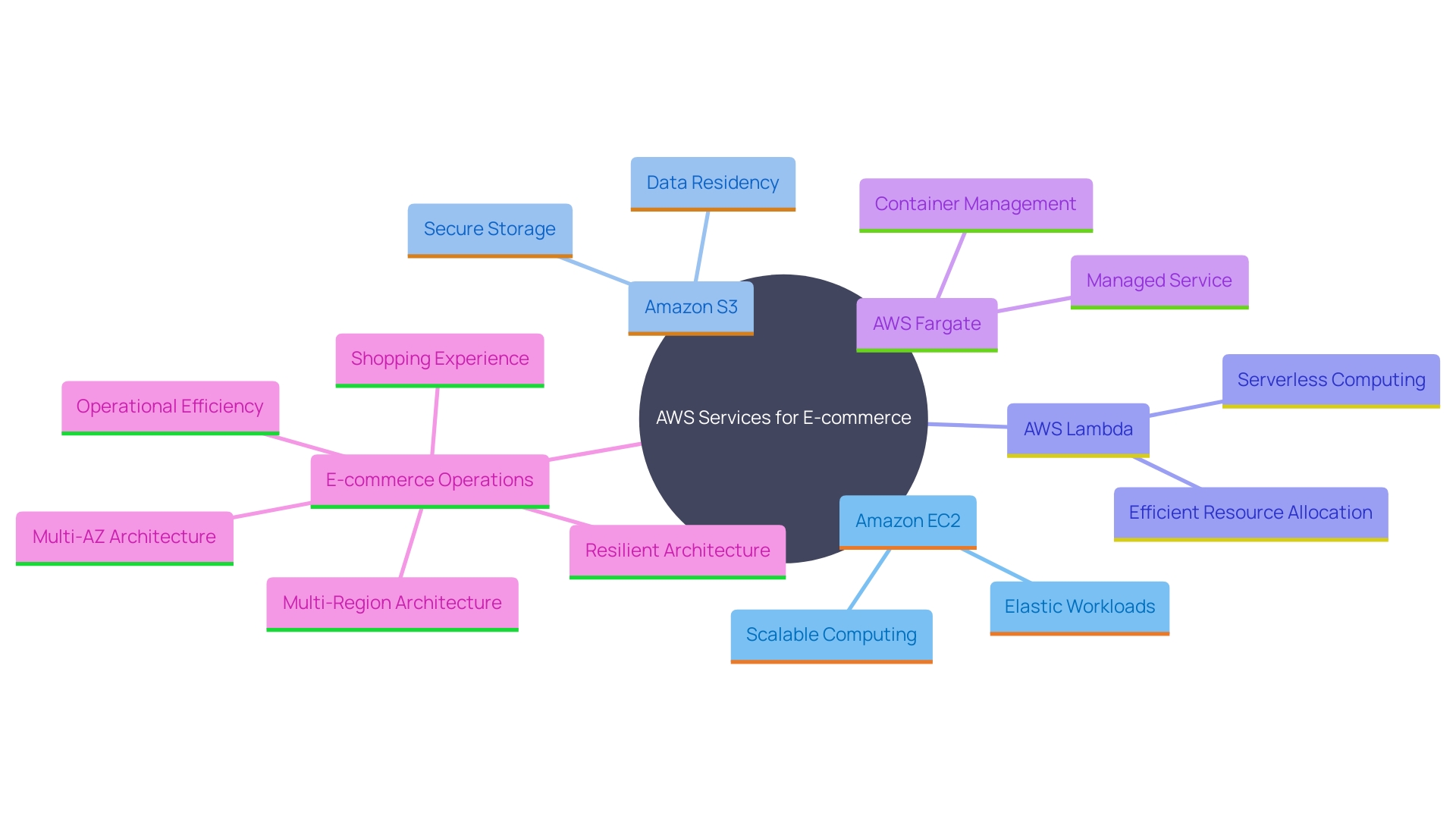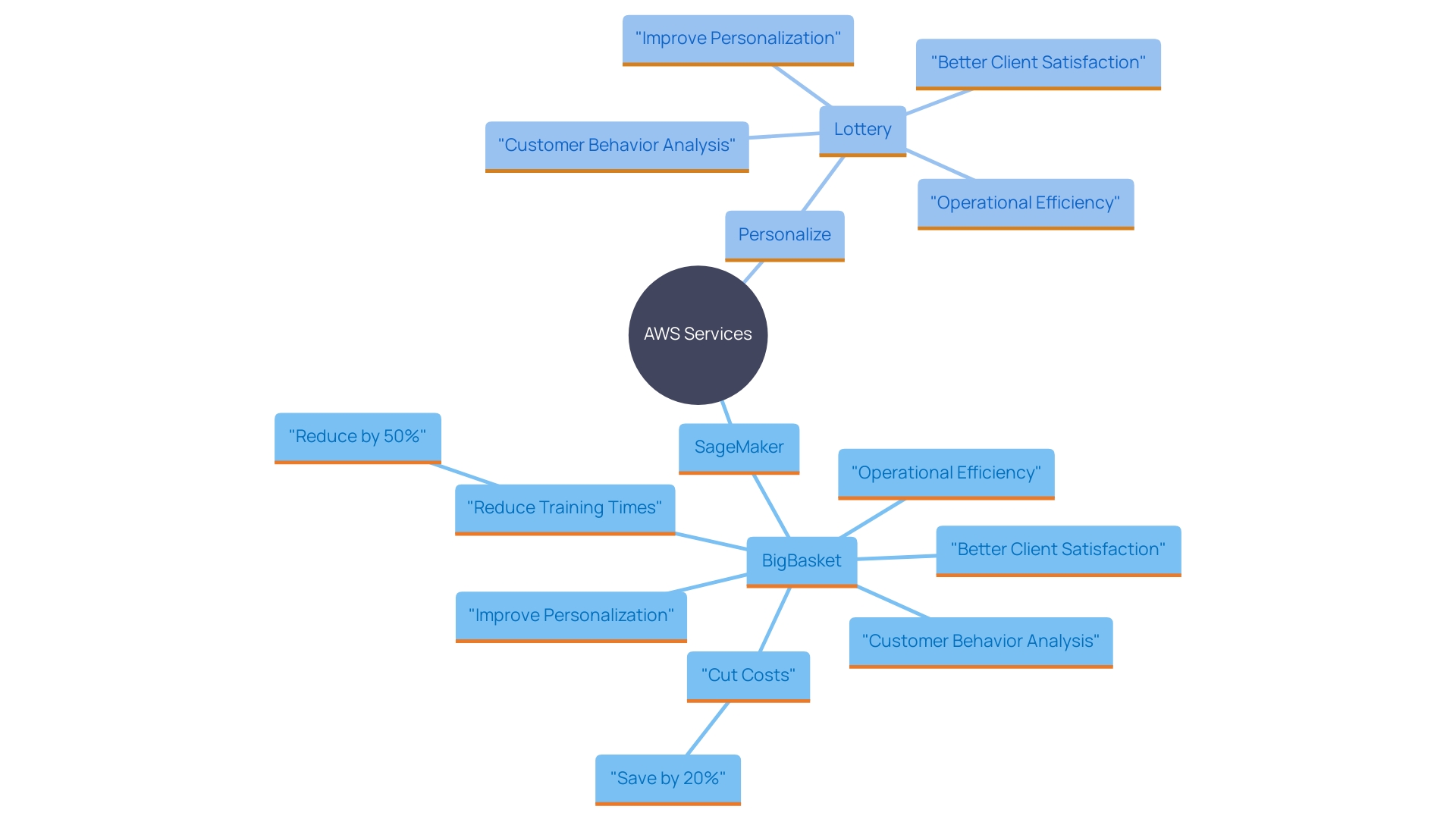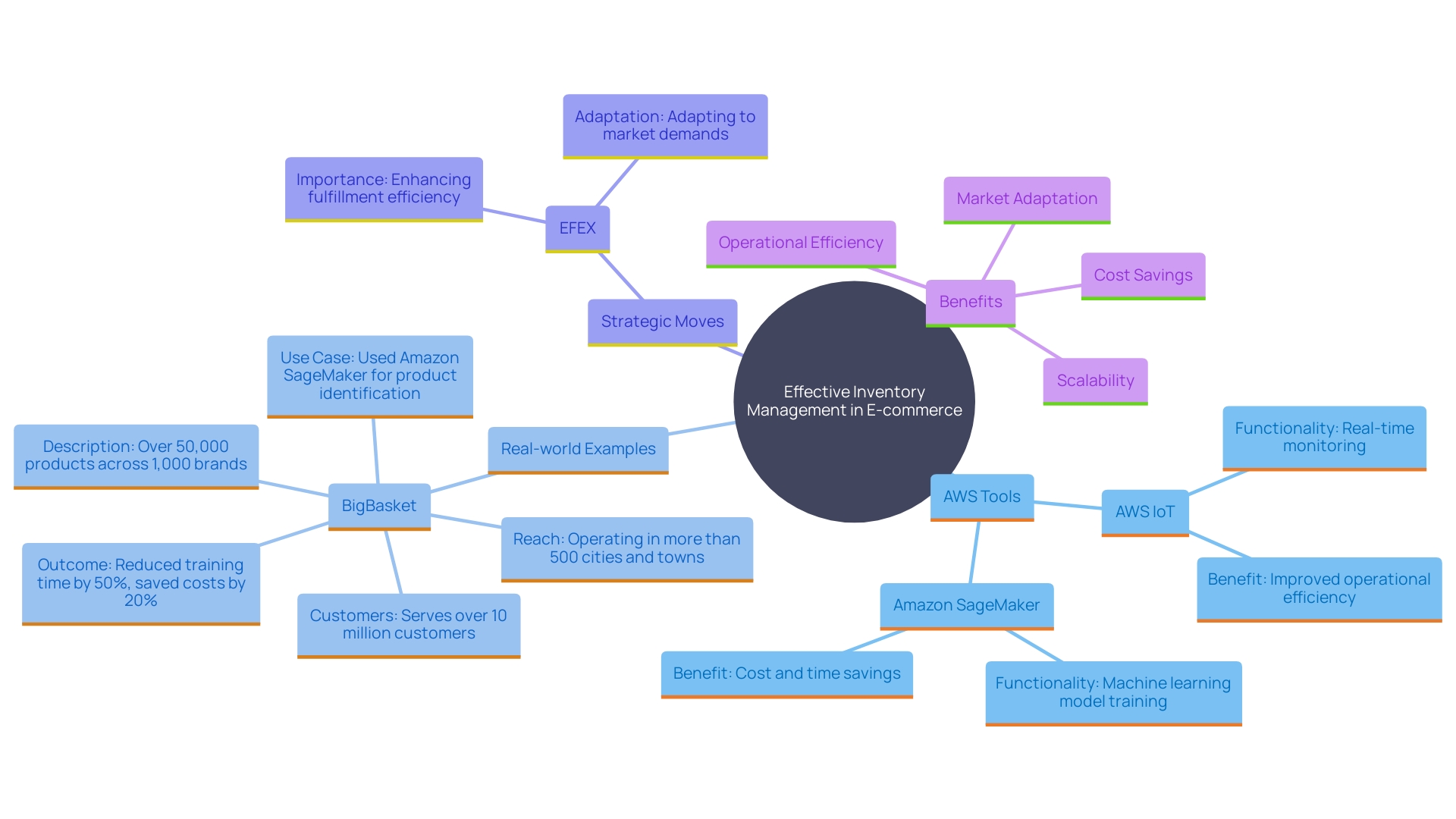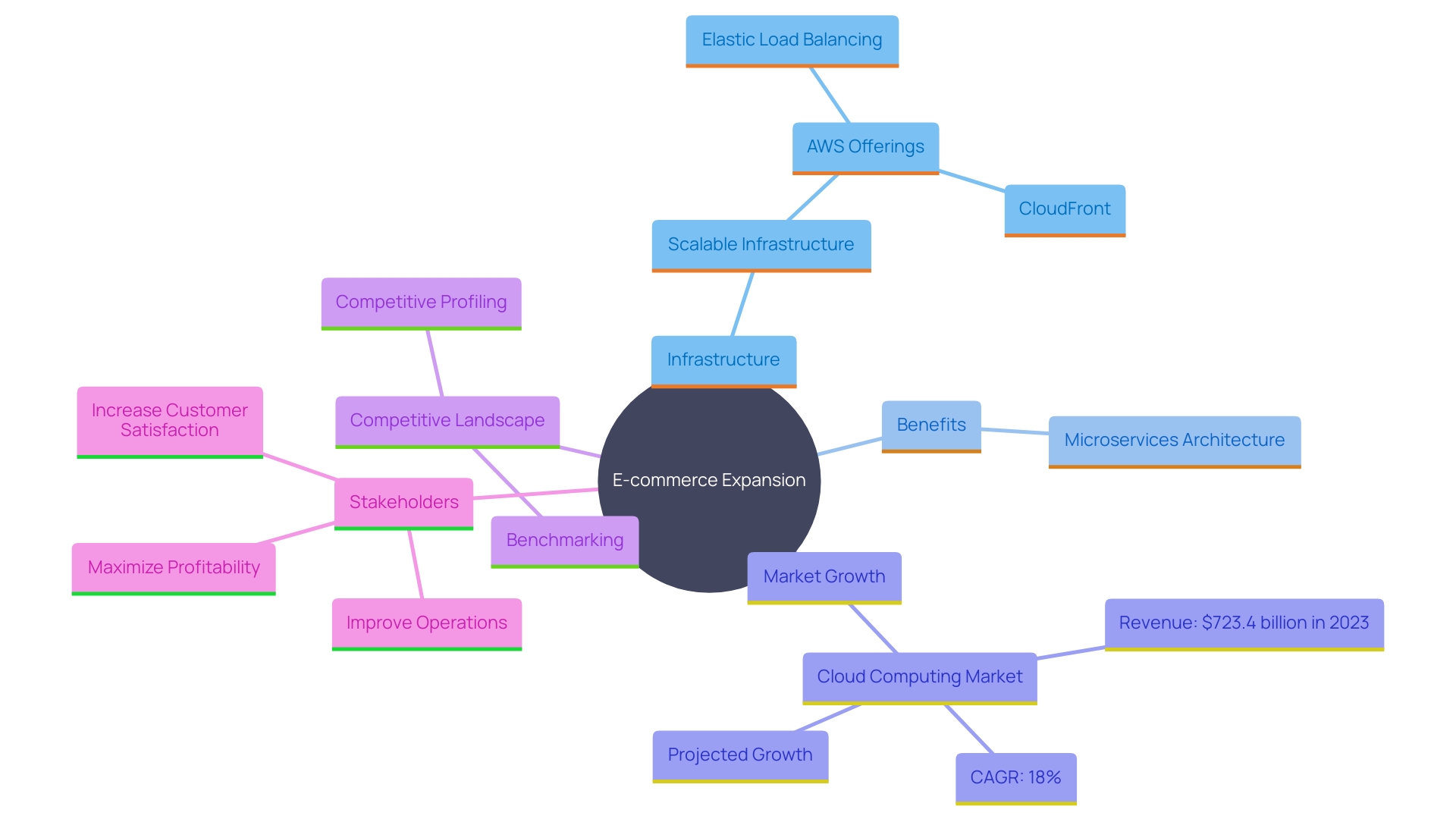Introduction
Leveraging the power of AWS services, e-commerce businesses can significantly enhance their operations and drive growth. AWS offers a comprehensive suite of cloud services, including Amazon EC2 for scalable computing, Amazon S3 for secure storage, and AWS Lambda for serverless computing. These tools enable businesses to manage fluctuating demands efficiently, optimize resource allocation, and ensure a seamless shopping experience for customers.
With AWS's robust infrastructure, companies can deploy applications rapidly and scale during peak periods, maintaining cost efficiency by paying only for the resources used. This article delves into how AWS services not only simplify system maintenance and enhance security but also provide unmatched scalability, flexibility, and reliability essential for modernizing e-commerce platforms.
Leveraging AWS Services for E-commerce Growth
AWS offers a wide range of cloud solutions that significantly enhance e-commerce operations. Utilizing Amazon EC2 for scalable computing capacity, Amazon S3 for secure storage, and AWS Lambda for serverless computing, businesses can adeptly manage fluctuating demands and optimize resource allocation. These offerings enable rapid application deployment, ensuring a seamless shopping experience for customers and allowing for swift scaling during peak periods. As the leading cloud platform, AWS's infrastructure is crucial for building a robust and responsive system, providing real-time updates and maintaining cost efficiency by charging only for the resources used. For instance, leveraging AWS Fargate can reduce costs by up to 99.9% compared to traditional fixed server setups. This method not only simplifies system upkeep but also improves security and integrates smoothly with other AWS offerings. Notably, AWS remains the top choice for large enterprises, offering unmatched scalability, flexibility, and reliability, which are essential for modernizing e-commerce platforms.

Enhancing Customer Experiences to Increase Conversions
AWS provides companies with robust data analysis and artificial intelligence features through platforms such as SageMaker and Personalize. Utilizing these tools, companies can gain deeper insights into customer behaviors and preferences, enabling them to tailor their offerings more precisely. For example, Lottery, a significant online retailer, improved its suggestion features by utilizing SageMaker. This upgrade allowed Lotion to move beyond simple product relationships and develop a deep learning-based recommendation algorithm, significantly improving personalization.
BigBasket, another example, utilized SageMaker to develop a computer vision model for recognizing Fast-Moving Consumer Goods (FMCG). This implementation reduced training times by 50% and cut costs by 20%, showcasing the efficiency and scalability of AWS offerings. By examining client interactions and preferences, businesses can offer tailored suggestions and attentive support, such as through Amazon Connect, which further improves client satisfaction and loyalty.
The continuous innovation in AWS services, such as the new capabilities for AWS Supply Chain and the introduction of the palm recognition identity service, demonstrates AWS's commitment to helping businesses streamline their operations and respond swiftly to market demands. These advancements not only enhance client experiences but also drive sales and foster long-term relationships with clients.

Optimizing Inventory and Fulfillment
Effective inventory management is a cornerstone of e-commerce success, ensuring operational efficiency and customer satisfaction. AWS offers a suite of tools, such as AWS IoT and AWS Data Lakes, that provide real-time monitoring of inventory levels and in-depth analysis of sales trends. These insights empower businesses to integrate data seamlessly into their fulfillment processes, thereby minimizing the risk of overstock and stockouts.
For instance, AWS IoT Managed Services enables industrial equipment users to rapidly develop and deploy new capabilities, significantly reducing the resources required for maintenance. This is particularly beneficial for organizations that face challenges in obtaining real-time data on asset locations and status, as highlighted by Ben Tucker from Digi. He notes that data accuracy issues often lead to errors in inventory levels, causing stockouts or overstock situations.
Moreover, the use of AWS tools like Amazon SageMaker has proven effective in real-world scenarios. Take BigBasket, for example, which utilized SageMaker to train a computer vision model for FMCG product identification. This implementation reduced their training time by around 50% and cut expenses by 20%, demonstrating the concrete advantages of AWS offerings in enhancing e-commerce operations.
In alignment with the rapid growth of the e-commerce market, companies like EFEX have expanded their warehouse infrastructure to enhance fulfillment efficiency. Such strategic moves underscore the importance of robust, scalable solutions that AWS provides, facilitating businesses in meeting the evolving demands of the market.
Additionally, AWS supports automated fulfillment strategies that streamline logistics, ensuring timely delivery and enhancing customer satisfaction. This is crucial as companies strive to adapt to rapidly changing consumer demands, a point emphasized by Brian Houck from PwC, who believes that the next five years in the retail market will be dominated by adaptable companies.
In summary, AWS cloud offerings provide companies with the resources necessary to uphold effective inventory management, optimize fulfillment procedures, and remain competitive in a changing e-commerce environment.

Scaling Operations with AWS Tools and Services
As e-commerce businesses expand, the need for scalable infrastructure becomes crucial. AWS tackles this with offerings such as Elastic Load Balancing and CloudFront, which handle higher traffic and enhance website performance. By leveraging a microservices architecture, organizations can enhance agility and responsiveness, making it easier to adapt to market changes and customer needs. This approach aligns with the trend of using microservices to build scalable, maintainable systems, as highlighted by Amazon's extensive experience in e-commerce and cloud services. The cloud computing market, valued at $723.4 billion in 2023, is expected to grow at a CAGR of over 18%, driven by factors like the widespread adoption of microservices architecture and the increasing use of the DevOps model.

Conclusion
Integrating AWS services into e-commerce operations provides crucial benefits in scalability, efficiency, and customer satisfaction. By utilizing tools like Amazon EC2, Amazon S3, and AWS Lambda, businesses can effectively manage fluctuating demands while optimizing resources, ensuring a seamless shopping experience and cost efficiency.
Advanced data analytics and machine learning capabilities offered by AWS empower e-commerce companies to gain insights into customer behavior. Services such as Amazon SageMaker and Amazon Personalize enhance personalization, driving customer engagement and loyalty. Successful examples from companies like LotteON and BigBasket demonstrate the advantages of these tailored solutions in a competitive market.
Additionally, effective inventory management and fulfillment are vital for success, and AWS tools like AWS IoT and AWS Data Lakes streamline these processes. Real-time monitoring and data analysis minimize risks related to inventory mismanagement, further enhancing operational efficiency.
In conclusion, leveraging AWS services is a strategic approach that positions e-commerce businesses for sustainable growth. The advantages of improved scalability, enhanced customer experiences, and optimized operations underscore the importance of adopting AWS to remain competitive in the evolving landscape of modern commerce.




